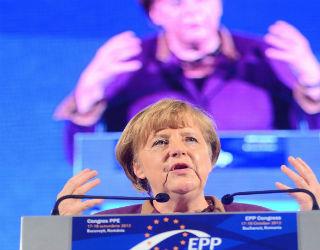
That leaves Angela Merkel as the only remaining head of government of a major country within the EPP family. Her ideological partners are disappearing, as the backing for her policies is.
by
N. Peter Kramer
Usually, the Christian Democrat leaders (EPP) gather in Brussels before each EU Council meeting (‘summit’) to make decisions they will foist on their colleagues, the other European leaders. But at the last summit in December they didn’t, because the EPP is losing strength in the Council, according to Brussels-watchers.
The EPP seems to be weakened by election outcomes across the EU in 2015. The Greeks chose a far-left alternative, Syriza, to replace EPP member New Democracy; in Portugal the socialists punished the EPP partner Popular Party for their austerity drive; after the Finnish elections, EPP Alexander Stubb was demoted to finance minister from prime minister; and the Poles rejected a coalition made up of EPP members Civic Platform and the Polish People’s Party. A few days after the December summit, Spanish voters deprived Rajoy and his Popular Party of a majority; but he is still there.
That leaves Angela Merkel as the only remaining head of government of a major country within the EPP family. Her ideological partners are disappearing, as the backing for her policies is. In December’s EPP meeting, Merkel and Viktor Orbán of Hungary clashed in the refugee debate. Although the bloc came up with a joint declaration on refugees, Merkel and Orbán were diametrically opposed in their views, with the Hungarian and his allies rejecting Merkel and Commission President Jean-Claude Juncker’s (also EPP) insistence on finding common solutions.
In this crisis also a regional alliance was proving decisive. The influx of refugees has consolidated the so-called Visegrád Group, bringing together the national-conservatives of Poland, Slovakian leftist Robert Fico, Czech Social Democrat Bohuslav Sobotka and Orbán. This quartet got surprisingly an unprecedented backing from the Council President Donald Tusk, a former Polish prime-minister.
May be weakened but –so far- unchallenged as Europe’s unofficial leader, Merkel suffers from a lack of serious high-level interlocutors: François Hollande is very unpopular in France, Rajoy is probably losing his job and David Cameron has his own agenda when it comes to the EU and migrants.
This lack of strong EU leadership became obvious as the number of fruitless EU summits on the refugee crisis escalated in the second half of last year. In the meantime the discussion continues, without any expectation that in the foreseeable future the Council will succeed in finding an adequate solution for the crisis.







